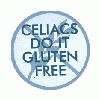-
Welcome to Celiac.com!
You have found your celiac tribe! Join us and ask questions in our forum, share your story, and connect with others.
-
Celiac.com Sponsor (A1):
Celiac.com Sponsor (A1-M):
-
Get Celiac.com Updates:Support Our Content
Is There A Problem With Gluten
-
Get Celiac.com Updates:Support Celiac.com:
-
Celiac.com Sponsor (A17):
Celiac.com Sponsor (A17):
Celiac.com Sponsors (A17-M):
-
Recent Activity
-
- knitty kitty replied to ABP2025's topic in Celiac Disease Pre-Diagnosis, Testing & Symptoms17
Guidance on next steps after the lab tests
@ABP2025, Here's some studies and articles that will help you learn more about thiamin and all... I will write more later. It's possible that your antibiotic for giardiasis has caused thiamine deficiency. https://hormonesmatter.com/metronidazole-toxicity-thiamine-deficiency-wernickes-encephalopathy/ And... https://hormonesmatter... -
- DayaInTheSun replied to DayaInTheSun's topic in Coping with Celiac Disease5
Being a burden to family/friends
Interesting you mention MCAS. I have come across mcas before but I wasn’t entirely sure if that’s what it was. When I eat certain food like dairy or soy my face gets so hot and I feel flush and my heart rate shoot’s up. And sometimes my bottom lip swells or I get hives somewhere. This started happening after I had a really bad case of Covid. Before that ... -
- Kiwifruit replied to Kiwifruit's topic in Celiac Disease Pre-Diagnosis, Testing & Symptoms7
Years of testing - no real answers
This is all really useful information, thank you so much to you both. I have a history of B12 and vit D deficiency which has always just been treated and then ignored until it’s now again. -
- trents replied to Gill.brittany8's topic in Celiac Disease Pre-Diagnosis, Testing & Symptoms1
9 Year Old test results - help interpret
Welcome to the forum, @Gill.brittany8! There are two main genes that have been identified as creating potential for developing celiac disease, HLDQ2 and HLDQ8. Your daughter has one of them. So, she possesses genetic the potential to develop celiac disease. About 40% of the general population carries one or both of these genes but only about 1% of the... -
- Gill.brittany8 posted a topic in Celiac Disease Pre-Diagnosis, Testing & Symptoms1
9 Year Old test results - help interpret
Hi everyone After years of stomach issues being ignored by doctors, my 9 y/o daughter finally had an upper endoscopy which showed a ton of stomach inflammation. The GI doctor ordered some bloodwork and I’m attaching the results here. Part will be from the CBC and the other is celiac specific. I’m not sure what’s relevant so I’m just including extra i...
-




Recommended Posts
Archived
This topic is now archived and is closed to further replies.